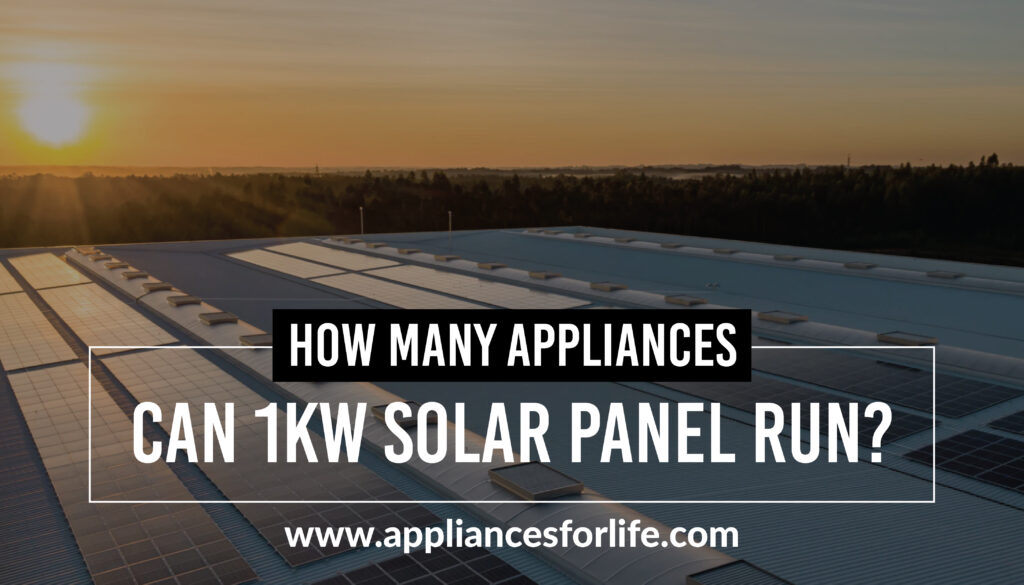- In recent times, the world has been shifting its focus from energy generation methods that are not eco-friendly. International and national laws incessantly discourage over-dependence on fossil fuel and other similar energy generation media. As an alternative to fossil fuels and others, renewable energy, championed by the use of solar panels, has become the order of the day.
- The adoption rate of solar energy increases daily. Many households now use it because of the immense benefits that are attached to its use. It is not as expensive as conventional energy generation, and it is the purest form of energy generation available so far. This article explores other benefits of using solar panels to run your appliances and their varying capacities.
There has been an unending clamor for climate advocacy in recent decades. Nations worldwide are constantly scrambling to limit their dependence on fossil fuels. It has been enshrined already in many International Instruments and Protocols. Many domestic laws have been dedicated to combating fossil fuel consumption and other non-renewable energy sources. The race to eradicate overdependence on fossil fuels has inspired several countries to invent renewable energy sources. Notable among these renewable energy sources are solar energy, converted to electricity through the use of solar panels and electric transformers.
Table of Contents
Toggle
Perhaps you are new to this topic and wonder why the world is in a ‘rat race’ to veer into alternative means of energy generation and increase its reliance on Solar Energy for power as opposed to fossil fuel. Well, note first that solar is the most abundant energy source on Earth. About 173,000 terawatts of solar energy strike the earth at any given time, which is considered 10,000 times the world’s energy needs. More importantly, by capturing the sun’s energy and converting it into electricity for the home and businesses, solar energy is a key solution in combating the current climate crisis and lessening our dependence on fossil fuels.
The pros and Cons of Solar Energy for your Appliances
Powering your home appliances using Solar Energy is not exactly a conventional means of energy generation. This fact has so far contributed to the adoption of Solar Energy. Despite some opinions about the affordability and efficiency of solar energy, it is being installed in homes now more than ever. Solar panels are more efficient- they will power your appliances just fine, they are not as expensive as many think, and most importantly, they are quite environmentally friendly and get even better. It, however, is important to know that despite the numerous benefits of solar energy, it may not make sense for every homeowner, depending on their geographic location, roof orientation, and current electricity usage. In some locations in the United States, the solar installation offers a decent return on investment; in others, it is not as lucrative as it is meant to be. This section will provide more detail s into the pros and Cons of Solar Energy.
Pros of Solar Energy
Solar works in Many Climates
The majority of people have the notion that solar is not a fit in colder climates, but this is not entirely true. Solar panels are, in fact, believed to be more efficient in colder temperatures because it is proven that excessive heat can reduce the voltage they produce, while more hours of direct sun exposure will indeed help a solar system generate more electricity. However, this is not to conclude that solar panels can not generate energy in low-light locations. They will. You may need more panels if you reside in a low-light area. To put into perspective, someone living in Seattle may need a somewhat larger solar system to get the same results as someone in Southern California.
Solar is now more affordable than ever
Over the years, the price of solar systems has dropped significantly. Recently, it was recorded that since 2015, the price of solar panels and installation has dropped and its dropping. In fact, in many parts of the world, the price of solar is less high than the conventional means of energy generation. In the United States, some incentives are set up by the government to encourage the use of renewable energy like solar. There are some in the form of tax rebates and loans. There are even some financing options in the United States, like the no-money-down leasing to encourage the use of solar energy. As a matter of fact, If you purchase a solar power system in the United States, you may be eligible for a 30% federal income tax credit and other local incentives. All of these make the use of solar energy less expensive than the conventional form of energy generation.
Solar panels have a long life span and are widely accepted
Solar panels are quite durable and can withstand even harsh weather conditions.
On the other hand, Solar energy is widely accepted and a practical alternative energy source. Solar is for every for now. You may not have to fulfill any stringent government policy to have your solar panels in place. It is being embraced by people across the entire sociopolitical spectrum. Homeowners covering all demographics continue to install solar energy systems.
Cons of solar energy
Solar does not work at night
If you wondering whether you can go completely off the grid by going solar. well, totally doing away with electricity with the hope of relying solely on solar may not be a realistic ambition for most applications of solar technology. While many solar companies, including SunPower, offer home battery storage solutions, it’s only recently that home batteries have become easily accessible to most homeowners. Hence, solar energy is mostly used during the day with excess energy stored up from sunlight, delivered back to the conventional utility grid or a battery.
You can’t install a home solar system yourself.
Unfortunately, this is one task you may have to set out. DIY hacks may take you to a certain extent, but you must leave this one to the experts because there are some technicalities you may be unable to handle. While those DIYers might think that not being able to install solar themselves is a disadvantage, getting the experts to handle the planning and technology to go solar turns the potentially complex solar installation into a very simple process for most homeowners. It is necessary to seek expertise because most solar panel warranties won’t cover defects caused by improper third-party installation. Even if a DIY installation doesn’t cause a defect, homeowners may incur extra warranty fees for uninstalling defective panels and reinstalling replacement panels not originally installed by a certified-installation contractor. Therefore, it is necessary to procure the services of an expert for installation.
Solar may not work on every roof
You have probably heard rumors that solar may not work on some roofs. Well, this is true, solar does not work on every building, depending on shading and roof orientation. To make the most out of your solar system, it helps to have plenty of roof space that gets sunshine.
How many appliances can a 1kw solar panel run
Knowing the appliances, you can run on your 1kw solar system is important for optimizing its use appropriately and knowing which appliance uses the most electricity, and avoiding its abuse on the other hand. Also, it is important for you to understand that you can either use your solar system off-grid or on-grid, as the case may be. When your solar system is off-grid, it means that, during the day, when the sun is shining, your solar system will produce electricity, and you will be able to consume electricity for the appliances that need to run and the surplus or unused power will be stored in a battery so that at night, when there is no sun, your solar panel can use the stored up electricity from the batteries to power your home and run your appliances. Essentially, when you are off-grid, it means you are not connected to your electricity provider. The advantage of this off-grid system is that you can be in the most deserted place on earth, where there are no traces of electricity at all, but you will be able to produce electricity for your house as long as there is sunlight. Consequently, the number and kind of appliances you can power with this system depend on the number of batteries you have. You may be able to power a whole lot like your Air Conditioner, washing machine, refrigerator, and even water pump, but you will need a whole lot of batteries, too, and this venture may significantly escalate your project and maintenance cost.
On the other hand, you may choose to go on-grid with your solar system usage. when you do this, it means that you run a solar system that is connected directly to your utility providers, hence no batteries for external storage of power, and consequently, it may be possible for you to run appliances like your Air Conditioner, washing machine, refrigerator and even your water pump for any number of hours without any hassles. From the definition of the on-grid system, I’m sure you can already tell that it is not functional in an off-grid location.
It was critical to explain how the on and off-grid systems work to answer our primary question in this article, which is – ”How many appliances can 1kw solar panel run?”. Now that you know that a solar system can be either be on-grid or off-grid, you know what category of solar user you are, and all that you now need to understand is how many appliances you can use with a 1kw solar on-grid or off-grid system, as the case may be.
What You Can Run On 1 KW Solar Off-Grid System
Before we delve deeper, let us understand the basic calculations in solar and how some basic electricity units are used. Watt is the unit of power, while Watt and Kilowatt are used to show the rate at which power is consumed by a device. For example, a 200-watt dishwasher will consume power at the rate of 200 watts per hour. On the other hand, Kilowatt is a bigger unit, and is used to depict a bigger wattage of power. To put it into perspective, just like a kilometer is to meter, so is kilowatt to watt. Not that 1000 watts makes 1 kilowatt (1Kw). Hence, for you to know the number of appliances that a 1 kilowatt of power will run, you need to know the wattage of each of those appliances.
You also need to understand that a solar panel’s power-generating capacity is measured in Kilowatts. Hence, 1 kW of solar panels, if oriented properly and receiving a good amount of sunlight without any shadow impact, will generate 1 kWh of electricity in an hour. And, if your house receives 6 hours of sunlight, then theoretically, your solar panels will produce 6 KWh of electricity.
To know the number of appliances a 1Kw solar panel can carry, check for the wattage of the appliance(s) in question and know how long they will be used. i.e., how long they will stay connected to power. If, for example, you use a 100-watt LED TV for 10 hours, it will consume 100 Watt multiplied by 10 hours = 100 X 10, which is 1000 watts, and you know 1000 watts equals 1 Kilowatt. In essence, this means your fully charged 1 Kilowatt solar has lasted only 10 hours of your 100-watt LED TV use. From this formula, it is now easy to understand how many solar panels you need to run your appliances, depending on their energy consumption ability and numbers.
What you can run on a 1 KW Solar On-Grid System
You need first to understand how a solar on-grid system works. Hence if you skipped the section above, you may need to return to it. That said, the beauty about a solar on-grid system is that you can use any number of appliances for any number of hours, even on a small system of 1KW, but you will be charged for those extra units used.
In conclusion, using 1 kW of solar panels, you can run high-power consuming appliances for long hours if you have installed a solar on-grid system.
But if you have installed a solar off-grid system, you will be able to power high-power-consuming appliances for less time unless you increase the size of your solar system and the battery storage capacity.
FAQs
Can a 1KW solar panel power my 200-watt refrigerator?
Now that you have an idea of the power-consuming capacity of your refrigerator, the other thing you need to know is how long you will be using it. i.e., how long you will have it connected to power. Once you have this information, simply multiply the wattage of the refrigerator by the number of hours it will be connected, and you will have your answer
Is it possible for my 1kw solar panel to run more than 5 appliances?
The number of appliances a 1KW solar panel can run will depend on the capacity of each of those appliances and how long they will be connected to power. Hence, to know the number of appliances that can run on a 1KW solar panel, the wattage of each appliance can be added together, then multiplied by the number of hours they will all be used for.
What should you choose, a 1kw system or a 3kw system?
Which system to choose primarily depends on your needs and requirements. A 1kw solar power unit is generally most suitable for homes requiring 4 – 5 units of electricity per day. Whereas 3kw is more suitable for homes or houses with more rooms or electricity needs than 1kw solar units can supply. Furthermore, 1kw solar panels are usually more affordable than other units. Therefore for a cheap and small size of solar panels, you may consider purchasing a 1kw solar power system & 3kw for covering major electricity requirements to run equipment like Air Conditioner & Washing machines.
21 MINUTES
ESTIMATED TIME DESIGNING AND UPLOADING THIS ARTICLE
11 HOURS
ESTIMATED TIME RESEARCHING AND WRITING THIS ARTICLE
You Might Also Like

How to Install Recirculating Pump on Tankless Water Heater?
What is a Recirculation Pump? A tankless water heater recirculating pump is an accessory designed to improve the efficiency and convenience of a tankless water heating system. It addresses the common issue of delayed hot water delivery to faucets or showers, particularly in larger homes
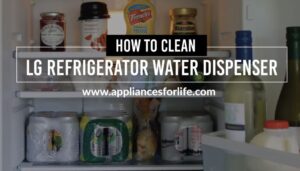
How to Clean LG Refrigerator Water Dispenser?
A lot of people run their refrigerating units every minute, all day, all week, without ever stopping to use them. This makes the refrigerator, perhaps, the most used kitchen appliance ever. Now that it even comes with tech integration, we can now enjoy many features

Since the blender is unarguably the most underrated kitchen appliance on the planet right now, it’s no surprise that people are now on a mission to know about the different functionalities of a blender in a bid to maximize its use. One thing about humans,
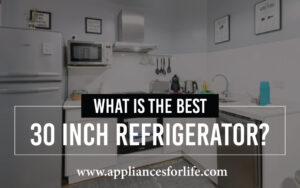
What is the Best 30-inch Refrigerator?
Refrigerators have become a necessity in every modern household. They’re so important that almost every household in the United States owns one. If you’re in the market for a new unit, it’s only normal for you to ask questions. What brand of refrigerator has the

A Guide on All the Best Vegetables to Juice
Have you ever wondered about the fruits and vegetables you drink? Have you done experiment after experiment but still can’t get the taste and texture you want? Although this all depends on personal preferences and tastes we have collected the top vegetables which you should
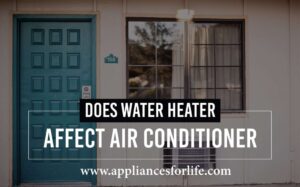
Why Does The Water Heater Affect The Air Conditioner?
We all know the importance of energy efficiency in keeping our electricity bills at bay all the time. Usually, no appliance should affect the other, but it’s not impossible to see. When a water heater is not properly used, it can affect the air conditioner

How To Make Popcorn In A Toaster Oven
How To Make Popcorn in a Toaster Oven Toaster ovens have long been a staple in many homes worldwide; this is so because it is capable of doing a lot in the kitchen. Its versatility makes it a perfect fit for cooking eggs, making waffles,

Best Rated Kitchen Appliance Brand
If you have ever been confused about what the best-rated kitchen appliance brands are, this article will help you sort that out with detailed and well-researched facts. Hopefully, you’ll find this really helpful and perhaps might help you make the best decision on your next
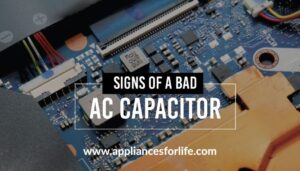
For many years now, the importance of air conditioning units has been made obvious to many, and you can tell from the sales records only in the United States. Air conditioners are more than what you install on your house to make things cool. The
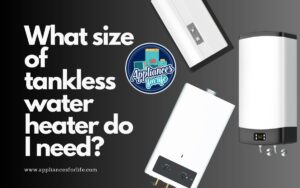
What size of tankless water heater do I need?
It’s always surprising how essential tankless water heaters are today. However, despite their growing importance, they rarely get talked about; or better put – they don’t get talked about enough, making them underrated. Tankless water heaters have everything their traditional counterparts everyone is used to

